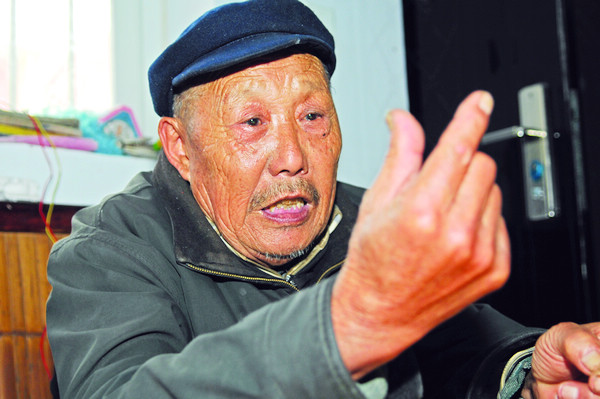|
|||||||||||
|
 |
|
He Zhaosheng, a resident of Huixian city of Henan province, tells how he was relocated three times in his life. [Xiang Mingchao / China Daily] |
ZHENGZHOU - Just like the water that was redirected through his ancestral village, He Zhaosheng's life has changed streams several times.
In his latest diversion, he was uprooted in June with about 330,000 others evacuated for construction of the South-North Water Diversion Project.
"It's for our nation," He said briefly, as he left his village in Xichuan county, Henan province for the newly-built relocation community in Huixian city, 500 km to the north.
Most of the time now he sits in the courtyard quietly, watches TV or chats with the neighbors when his children are at work in the factories in town.
He walks in slow steps using a crutch, and his old-fashioned blue trousers hang baggy.
His hearing is wearing down, and the thick wrinkles on his face tell his age.
However, he talks briskly and frequently gestures when he starts sharing his migration experiences, as if they were his great sources of excitement and pride.
The first time the 75-year-old farmer migrated was in 1959, when he volunteered to develop Northwest China's Qinghai province.
It was a tough 2,000 km journey from his hometown, and he and his wife spent a whole day walking, five days in a freight carriage, and the final two days on a truck before they arrived at a farm.
"It was nothing," he mentioned it casually. "I was young and didn't have many worries."
"It wasn't so different in Qinghai from home. The highland barley was just like wheat back at home, castor could produce oil like sesame did, and potatoes felt pretty much like sweet potatoes," he said.
Two years later the government said Qinghai was unsuitable for opening farms and sent them home.
Five years later, he was relocated again to Jinmen in neighboring Hubei province because of a dam project.
With six children and his parents to support, he had seven difficult years in Jinmen.
"I couldn't carry on. I just wanted to go home," he recalled.
He made a trip back in 1973, but the houses and fields of his ancestral village were submerged under a vast expanse of water.
The family stayed in the open for one night. The following day, he borrowed tools and built a temporary shelter for the family.
"We couldn't understand why father wanted to come back," recalled his eldest son He Hong-tao, who had no idea about the home village and only found life harder than before.
"We cooked sweet potatoes for almost every meal," the son added. With their former land gone, they were only allowed to cultivate limited fields on hillsides where the tuber was the only crop they could grow.
"When we complained, he would explain with patience, 'this is where our family has always lived.'"
Informed about the latest move, he stayed cool as if hearing something insignificant.
He persuaded his children to sell their belongings beforehand to "move light".
Although his three daughters still live back in their hometown, he is satisfied about the new migration. His sons have new houses and new jobs.
"As an ordinary farmer, it's not easy to leave his native place and move hundreds of kilometers away," said Yun Rongqin, head of Huixian county's migration office.
And not far from He's current residence is a newly-dug river that will convey water to more than 20 cities along its length after it is finished in 2014.
Maybe for him, though, the busy movement of life has found a place to rest from the constant flow.
Yang Xiaonan contributed to this story.
Hot Topics
Libya conflict, Gaddafi, Oil spill, Palace Museum scandal, Inflation, Japan's new PM, Trapped miners, Mooncake tax, Weekly photos, Hurricane Irene
Editor's Picks

|

|

|

|

|

|







